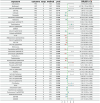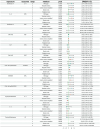Causal relationships between gut microbiota and urothelial carcinoma mediated by inflammatory cytokines and blood cell traits identified through Mendelian randomization analysis
- PMID: 40736872
- PMCID: PMC12311077
- DOI: 10.1007/s12672-025-03219-2
Causal relationships between gut microbiota and urothelial carcinoma mediated by inflammatory cytokines and blood cell traits identified through Mendelian randomization analysis
Abstract
Background: The role of gut microbiota in tumorigenesis has gained significant attention in recent years. This study aimed to investigate the causal relationship between gut microbiota and three types of urothelial carcinoma (renal pelvic cancer [RPC], urothelial carcinoma [UC], and bladder cancer [BC]), and to explore potential underlying mechanisms.
Methods: Two-sample Mendelian randomization (MR) analysis was conducted using GWAS data to identify gut microbiota-associated SNPs and evaluate their causal effects on the three cancers. Sensitivity analysis, reverse MR analysis, and mediation MR analysis were further performed to examine the roles of gut microbiota, inflammatory factors, and blood cells in cancer development.
Results: Mediation MR analysis revealed that Bacillaceae A significantly increased RPC risk by elevating IL-6 levels; CAG-452 promoted RPC by reducing SCF levels; and Succiniclasticum increased RPC risk by lowering platelet reactivity (WNR_Isobutyric_A._PLT_SD_SFL) (mediation effect ratio: 34.01%). Conversely, UCG-010 sp003150215 reduced RPC risk by increasing platelet reactivity (mediation effect ratio: 30.51%). For UC, Syntrophorhabdaceae promoted UC development by lowering IL-4 levels (mediation effect ratio: 22.46%), while Prevotella sp002437285 increased UC risk through modulation of WNR_Captopril_PLT_SD_SSC (mediation effect ratio: 30.58%).
Conclusion: This research identifies causal relationships between gut microbiota and RPC, UC, and BC, and elucidates their impact on cancer development through mediation by inflammatory factors and blood cells. These findings provide new perspectives and a foundation for the potential application of gut microbiota in cancer prevention and treatment.
Keywords: Blood cells; Gut microbiota; Inflammatory cytokines; Mendelian randomization; Urothelial carcinoma.
© 2025. The Author(s).
Conflict of interest statement
Declarations. Ethics approval and consent to participate: This research employed secondary data, with all original GWAS data having been cleared by the pertinent ethical review boards. Consequently, no additional ethical review is required for the utilization of this data. Consent for publication: Not applicable. Competing interests: The authors declare no competing interests.
Figures





Similar articles
-
Gut microbiota causally affects ulcerative colitis by potential mediation of plasma metabolites: A Mendelian randomization study.Medicine (Baltimore). 2025 Jun 27;104(26):e42791. doi: 10.1097/MD.0000000000042791. Medicine (Baltimore). 2025. PMID: 40587710 Free PMC article.
-
Inflammatory cytokines mediate the gut microbiota-EGPA subtype link: a Mendelian randomization study.Clin Rheumatol. 2025 Jul;44(7):3061-3071. doi: 10.1007/s10067-025-07526-5. Epub 2025 Jun 12. Clin Rheumatol. 2025. PMID: 40500572
-
Genetic prediction of immune cells, inflammatory proteins, and metabolite-mediated association between gut microbiota and COPD: a Mendelian randomization study.Sci Rep. 2025 Jul 1;15(1):21633. doi: 10.1038/s41598-025-05290-9. Sci Rep. 2025. PMID: 40594427 Free PMC article.
-
Dissecting Causal Relationships Between Gut Microbiota, Immunocyte Phenotype, and Migraine: A Mendelian Randomization Study.Brain Behav. 2025 Jul;15(7):e70693. doi: 10.1002/brb3.70693. Brain Behav. 2025. PMID: 40641356 Free PMC article.
-
Insights from Mendelian randomization and genetic correlation analyses into the relationship between endometriosis and its comorbidities.Hum Reprod Update. 2023 Sep 5;29(5):655-674. doi: 10.1093/humupd/dmad009. Hum Reprod Update. 2023. PMID: 37159502 Free PMC article. Review.
References
-
- Cai J, Rimal B, Jiang C, Chiang JY, Patterson AD. Bile acid metabolism and signaling, the microbiota, and metabolic disease. Pharmacol Ther. 2022;237: 108238. - PubMed
-
- Van Hul M, Cani PD. The gut microbiota in obesity and weight management: microbes as friends or foe? Nat Rev Endocrinol. 2023;19:258–71. - PubMed
LinkOut - more resources
Full Text Sources
